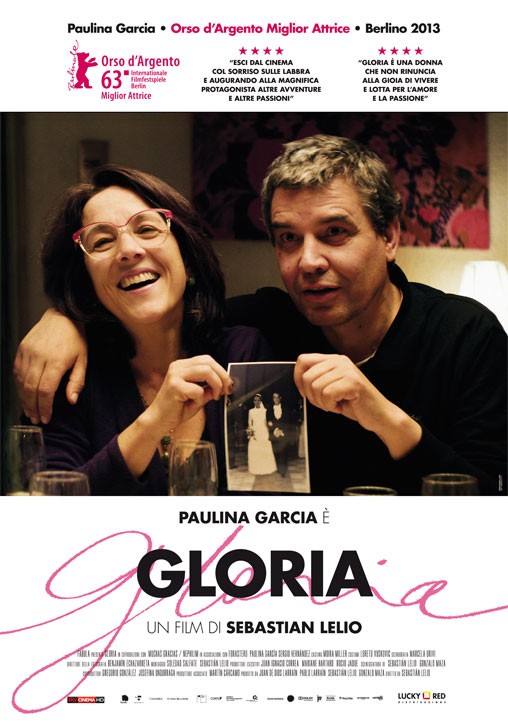
Gloria is a Chilean film
from Sebastián Lelio, with what really ought to be a star making turn from
Paulina Garcia, if foreign language cinema got as much attention as it should.
Gloria (Garcia) is in her late
fifties and is in search of a man. We are introduced to her with long, slow
takes which pick her out of the crowd in a bar in the opening shot and then
follow her throughout the rest of the film. We see everything from her
perspective – from her children who clearly call only rarely to her ex-husband
Gabriel (Alejandro Goic) who is coming to regret his past neglect, to her new
boyfriend Rodolfo (Sergio Hernández, who looks exactly like the late Ben
Gazzara) who is still under the thumb of his ex-wife and layabout daughters.
Over the course of the film, as Gloria and Rodolfo’s romance plays out, we get
to know Gloria, her fragilities and her surprisingly confident manner.
The best thing about Gloria is
Paulina Garcia’s performance, to which Lelio’s camera is largely subservient.
In much worse films, the figure of the middle-aged woman out for love is seen
as either pathetic or horrible. Garcia and Lelio make sure that Gloria is
treated much better than that – they refuse to find anything tragic or funny in
her situation, insisting instead only to document it as realistically and as
truthfully as possible. Indeed, the film is both sad and funny, but all the
best laughs are Gloria’s – we are most definitely laughing with her – and all
the sad moments are truthful and honest, not pitying or patronising. This
respect for a character shines through, giving the audience an equal respect,
and this empathy is ultimately what makes the film such a pleasing and joyful
experience. The film ends on a lovely, cheering moment of self-confidence –
Gloria may not be happy, but she is not letting that stop her from having a
good time. It is a great moment, because we feel that this character has gained
something positive and that she’ll be all right. Acting as the perfect
summation to the film, it is a realistic but heartening ending, where it could
have been cloying and sentimental. It is also helpful that the film does not
have her find happiness in a man instead of in herself – the kind of cop-out
ending that often mars Hollywood films that dare to address these themes, see,
for instance, Bridesmaids.
There is a political edge to the
film as well, in keeping with a strain of recent Chilean films that are
readdressing the country’s history, from Patricio Guzmán’s Nostalgia For The
Light and Pablo Larraín’s Post Mortem and No – Larraín takes
a producer credit here. A slight reference is made to life under the Pinochet
regime and students are marching the streets calling for revolution. Gloria is
made to represent Chile – a dark past, an inner conflict between change and stagnancy
and troubled by despondent youngsters. Initially, when we first meet Gloria’s
son and daughter (Pedro and Ana – played by Diego Fonecilla and Fabiola
Zamora), both are distant and have clearly not called in quite a while. And
yet, as the film moves along, they both appear warmer to her, as if a change in
her has facilitated an improvement in their relations. Meanwhile, Rodolfo’s
kids remain dependent on him and his inability to break these bonds is
ultimately his major failure. While the politics is there, it is dealt with
quietly and it is far from the film’s raison d’etre.
As well as that, Garcia and Lelio
(and, to a lesser extent, Hernández) challenge the traditional sex scene, which
is usually exclusive to the young and slim. Gloria features sex scenes
between two middle-aged people that are surprisingly explicit and yet are too
rarely seen in other cinema. It is an honest depiction and one that counters
ageism to offer a more democratic way of looking at sex in films. Though some
may find them a touch out of place (as they are in Blue is the Warmest Colour), it remains an example of a daring film that is not afraid to take
risks and challenge common prejudices, representing unintentionally the need
for a vibrant art cinema to oppose an increasingly conservative Hollywood.
Gloria then
strikes a blow for a more honest representation of age on screen. As worthy of
praise as it is, it is, nevertheless, fundamentally a charming and pleasing
film about a woman looking for love with a perfect, uplifting ending. Paulina
Garcia holds the film together with a daring, powerfully empathetic performance
while Lelio displays a great ability to capture moments of truth – particularly
in a birthday scene in which all of the major characters are present, one that is
full of nuances, significant glances and pregnant silences. Lelio is definitely
one to watch but then so is Garcia; their collaboration being so significant
that it is hard to separate their work for individual praise. However it is, Gloria
remains a fantastic achievement.
No comments:
Post a Comment